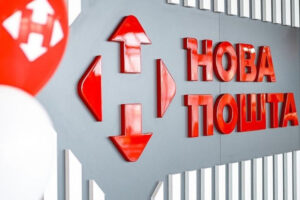
At the end of May, the National Securities and Stock Market Commission (NSSMC) approved the decision to place two new bond issues of Nova Poshta, Ukraine’s leading express delivery company: series G and H with a nominal value of UAH 1 billion each.
According to the regulator’s decisions, the issuer plans to conduct a private placement of bonds.
The SMIDA disclosure system indicates that the nominal value of one bond is UAH 1,000.
It is noted that 35% of investments will be attracted to the development of the terminal network, 15% to IT, 30% to BDF containers and motor transport, and 20% to packaging for parcels.
According to Nova Poshta’s financial report for the first quarter of 2025, its net consolidated revenue increased by 20.7% compared to the first quarter of last year, to UAH 14 billion 333.2 million, while net profit decreased by 21.4%, to UAH 567.7 million.
The main activity of Nova Poshta remains the express delivery of documents, parcels, and palletized large-size cargo. The company is the leader in express delivery in Ukraine. Its ultimate beneficial owners are Volodymyr Poperechnyuk and Vyacheslav Klimov.
According to the rating agency Standard Rating, as of early April this year, Nova Poshta had total accounts payable of UAH 13.51 billion and, in addition to long-term bank loans, used resources raised from the issue of two series of bonds – E and F, each worth UAH 1 billion, which were registered by the National Securities and Stock Market Commission on April 26, 2024.
The nominal yield on Series E bonds is 17% per annum, Series F bonds is 16% per annum, and the interest period is 91 days. The maturity date of Series E bonds is May 31, 2026.
In January 2025, Nova Poshta redeemed Series D bonds issued in April 2023 in the amount of UAH 800 million, and prior to that, in 2020-2024, three more bond issues totaling UAH 1.8 billion.

Market under geopolitical pressure
This week, the cryptocurrency market experienced serious turbulence due to the escalation of the conflict in the Middle East. Following reports of Israeli strikes on Iranian targets, the price of Bitcoin fell below $103,000, and the total market capitalization of the cryptocurrency market declined by more than $140 billion. Later, BTC partially regained its positions, settling in the $105,000–107,000 range.
Ethereum also lost about 5%, dropping to $2,510.
Alternative tokens (Solana, Cardano) fell by 2–3%, while XRP unexpectedly rose by 2–2.4%.
The fear and greed index remains in the “Greed” zone (~60), but amid instability, it could quickly shift to the “Fear” zone.
How is the war between Israel and Iran affecting the crypto market?
Short-term and long-term forecasts
June forecast:
3–6 month forecast:
Long term:
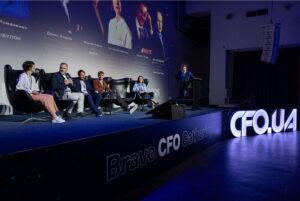
On June 6, Kyiv hosted the first event in the 23rd Ukrainian CFO Forum series — the Brave CFO Gathering conference, which brought together CFOs, strategists, CEOs, and digital experts to discuss major transformations in financial management.
This year, CFOs focused on innovation, artificial intelligence, ERP, digital assets, automation, and risk management in uncertain times.
The forum organizers, the FAService team, invited over 30 experts, ranging from CFOs of multinational companies to CEOs of technology businesses, internal auditors, analysts, and experts in law, taxation, and digital transformation. Among them were:
Heads of finance and internal control functions:
CEOs, ERP consultants, product/technical directors:
Analysts, experts in data management, taxation, compliance, and legal risk:
The Brave CFO Gathering 2025 program included:
In the fourth year of full-scale war, events are unfolding faster than the calendar. But some things remain unchanged—the need for people and decisive action. FAService CEO Igor Solovikh opened the conference with a personal address:
“I honestly didn’t know how to start this morning, considering the night under shelling. But I know for sure that Brave is not just a word in a logo. Today is about courage, and that’s really true. The FAService team is sincerely happy to welcome those who think, act, and move forward. We are not only about education, but also about responsibility. That is why today, together with our partners from Training to Win, we are launching a charity fundraiser for an evacuation drone for the front lines.”
Participants in the event received badges with a QR code for the fundraiser, as well as the opportunity to take free training in tactical medicine and combat training from the Training to Win organization by joining the initiative. The unique land drone, which has already been certified by the Ministry of Defense, was presented by Yuriy Krykunov, head of Training to Win: “We invite businesses to become allies in rescue efforts.”
Tax transformation: Digital assets, transparency, and new rules of the game for business
After an emotional start to the conference, Vita Forsyuk, advisor to the head of the National Securities and Stock Market Commission, took the stage. Instead of a traditional presentation, there was a lively conversation. The discussion covered crypto regulation, tax initiatives, and European integration commitments. Below is an abridged and edited version of the interview for clarity.
– Do we even have a legal regime for virtual assets? Because everyone is used to thinking, “nothing is regulated.”
That’s a myth. In 2023, the concept of “digital property” was introduced into the Civil Code, and it is now part of civil circulation. Virtual assets have also been included, although there is no clear law yet. But the basis is there: if there is no special regulation, the general rules for things apply.
– Okay, but what is the difference between “digital” and “virtual” assets?
Digital assets are a broader concept. They include tokens, accounts, and digital content. Virtual assets are just one type of digital asset. Examples include Bitcoin, stablecoins, tokenized vouchers, NFTs, security tokens, and so on.
– How should all this be accounted for? Are they intangible assets? Or are they financial instruments after all?
It depends. There are three types: financial instruments, such as stablecoins or security tokens; intangible assets, such as NFTs; and advances, such as utility tokens, which provide access to services in the future. The EU and international standards do not invent separate rules; they advise assessing them according to their economic substance. But in Ukraine, where old national standards are still in force, a paradox arises: the list is closed, and common sense is optional.
– So how does the state plan to tax this? And what are the approaches for individuals and legal entities?
Legal entities: everything that generates income is taxable. This includes both crypto-to-crypto and crypto-to-fiat. Adjustments to financial results are provided for, as with securities. The problem is that until there are guidelines from the Ministry of Finance, expenses cannot be taken into account. Individuals: only crypto-to-fiat is taxable. Mining and free tokens are not taxable. A minimum non-taxable income (one minimum wage) is provided for, but expenses can only be confirmed after a list of documents from the Ministry of Finance has been published.
– What if a company operates under a simplified tax system or a single tax? Can it deal with crypto?
No. If you are on the simplified tax system or pay a single tax, transactions with crypto automatically deprive you of this status. At least, according to the current version of the bill.
– So we shouldn’t dream of amnesty either?
For businesses, no. But there is a special provision for individuals: if you sell tokens acquired before the law comes into force in 2026, you can pay 5% tax instead of the standard 18%, without any documents. This is a kind of conditional “amnesty for Bitcoin.”
– What about VAT?
Transactions with stablecoins and decentralized currencies are exempt from VAT. But NFTs, utility tokens, and digital services will be subject to VAT. Plus, there are exceptions: if you provide professional consulting, VAT is also payable.
– What about international information exchange? CRS, DAC 7?
CRS is already in place. The tax authorities have received the first batch of information and are currently processing it.
DAC7 (or rather, its adaptation for Ukraine) will cover most digital platforms. Bookings, marketplaces, services. Even if it’s Web3. Currently, the only exception is purely informational websites or internal portals.
– When can we expect a vote on bill 10225-D?
There is a chance in June. But it is difficult to predict. New amendments appear every day, and for some reason, the focus is on individuals. And there are still plenty of “surprises” for companies. Especially regarding assessment, revaluation, and professional judgment, which will become a lifeline.
International standards + Ukrainian specifics = successful ERP transformation
After talking about transparency and taxes, those who have already gone through the process of change and are ready to share their experience took the floor.
Orbico Ukraine, a major player in FMCG distribution, together with the team at Innoware, a provider of IT solutions based on Microsoft products, shared their experience of transitioning from 1C to Microsoft Dynamics 365 Business Central.
This case study discussed not only the change in the system, but also the change in the work culture. CFO Orbico Olena Basova, CEO Innoware Dmytro Popinako, and business analyst Anastasia Katsan told how they implemented a full transition in six months: VAT accounting, integration with Medoc, reporting, data transfer, and compliance with both local and group accounting.
For the Orbico team, the main trigger was the need to get rid of Russian systems (1C, BAS), which are still on the market despite security risks and technological backwardness. The initiative is supported at the group level: for a company operating in the EU, ERP is not just a tool, but part of its reputation.
From a technical standpoint, Microsoft Dynamics 365 Business Central adapts to local legislation, operates in the cloud, and scales according to the size of the business. Thanks to its open code, the system allows you to combine ready-made modules with custom ones.
The session raised many questions from the CFO community: how to set up reporting, how much does implementation cost, and what does integration with Medoc look like in practice? Orbico’s answer: the cost did not exceed expectations, everything was completed on time and was made possible by high-quality preparation and a clear focus on business priorities.
“The most valuable thing is not only the result in terms of technology, but also the change in mindset. This is the foundation for those who want to grow and survive,” said Olena Basova, CFO of Orbico Ukraine.
Session 1. Transformation of the financial function
Can a CFO become a leader of change in a company, rather than just an “Excel ATM”? This was the rhetorical question posed by the moderator of the first session, Denis Azarov (MBA, CFO with 20 years of experience, expert in financial strategy). The speakers were Viktor Piddubny, Director of Finance and Business Performance at Danone, and Yulia Dankova, CFO at Metinvest, who presented practical cases using innovation, AI, and automation in finance.
Piddubny began with a reflection on resilience in times of uncertainty, emphasizing that there are three main components: flexibility, adaptability, and proactivity. According to him, these are what allow financiers to not just “put out fires,” but to work proactively.
He also touched on the topic of cash flow management and cited some telling statistics: most companies that went bankrupt did so while having a profitable P&L but with cash gaps. The solution is regular forecasting. And this, according to the speaker, is also the responsibility of the CFO.
“I believe that the future of the financial function is not the Chief Financial Officer, but the Chief Value Officer. We must help businesses create the future, not just count the past,” said Victor Piddubny, Director of Finance and Business Performance at Danone
Yulia Dankova joined the discussion with a powerful message: “Today, Metinvest is celebrating its 19th anniversary. We are a young company with faith in victory. And our transformations are not about hype, but about survival and development.”
The speaker presented specific technologies that are already being used in the group of companies: computer vision systems, intelligent document processing, automated translation, and AI-based production safety controls. For example, artificial vision helps recognize documents of any format and language without additional training, processing up to 40,000 pages per month.
“We were able to implement a full cycle of ‘hiring’ a robot: it is selected, trained, and then dismissed if it is ineffective. The robot does not receive a salary, but it consumes resources. And this also needs to be managed,“ said Yulia Dankova, CFO of Metinvest
At the end of her presentation, Dankova drew attention to another important insight: transformation is not just about finance, but about new responsibilities. Both for people and for machines. ”AI doesn’t just read your documents — it learns to think like you. The question is: what are you teaching it?”
Editor’s note: It is worth noting that the audience was not passive. They actively participated in the conversation, asked questions, and discussed the issues. Throughout the day, participants received nice bonuses and gifts from the event partners — Payoneer, ASCANIA, Bayadera, SMART business, TOMCAS | IBM, and Rozetka-EVO — for their active participation. After each session, there was a small reward for the most attentive participants. For the largest donation to the evacuation drone, participants had the opportunity to receive a subscription to all events of the Ukrainian CFO Forum 2026. Online viewers not only kept up with the audience in the hall, but also seemed to be thinking faster (which proves once again that CFOs never turn off their brains, even at home on the couch).
Leaders from 1C to SAP: how Ukrainian business is restructuring its processes to meet global standards
The conference program was filled with live interviews. The organizers decided to stir things up, and they were right. The “Q&A from the stage” format allowed speakers to openly share their experiences and the audience to learn more than what slides can offer.
Andriy Oleksiuk, Commercial Director at Business Evolution, took the stage with a short story about a major transformation. His position, “we are not integrators, we are conductors,” became the leitmotif of his entire speech.
“We understand what 1C is and how it has become ingrained in the nervous system of the business. But to go global, you need something more. SAP is like a Swiss watch. And we are the ones who help you make the transition.” — Andriy Oleksiuk, Commercial Director, Business Evolution
Case panel. Behind the scenes of ERP implementation
After candid interviews on stage, the audience immersed themselves in practical case studies with key decision-makers on ERP transformation. The discussions were frank and unvarnished, both on stage and in the hall.
One such format was the discussion panel “Behind the scenes of ERP implementation,” moderated by Iryna Levkivska, Group CFO at Rozetka-EVO. The focus was on real-life experiences of transforming the financial function in companies of various sizes, industries, and structures.
The speakers were: Igor Kublytskyi, CFO, Continental Farmers Group, Iryna Nesterenko, Vice President of Operations, Biosphere Corporation, Dmytro Buga, CFO, Obolon, Marina Samoilychenko, CFO, LPP Ukraine, and Vladislav Maksymenko, Head of ERP Implementation, Biosphere Corporation.
Dmytro Buga shared the first case study. Obolon did not start with SAP, and not because it was fashionable. The company worked with “historically formed” internal developments that had not been documented for a long time and were essentially living a life of their own.
“We were faced with the fact that we had a process, but it existed only in the head of a developer who had been working since 1998. When he went on vacation, we weren’t sure how the system would behave,” said Dmytro Buga, CFO of Obolon.
The decision to implement Microsoft Dynamics was driven by the fact that it is a flexible platform for manufacturing, which allowed us to create a single financial model and consolidate management and accounting. However, the implementation timeline had to be revised due to delays in process description. But thanks to the creation of an implementation committee, the pace was accelerated.
Igor Kublitsky said that their project started back in 2018 when Salic acquired Mriya. The company faced the challenge of integrating the accounting systems of different structures and creating end-to-end analytics: “We had one company, Salic, and the old structure of Mriya. It was a period of merging two worlds, both in terms of technology and culture.” The solution was SAP, and the implementation was divided into several stages: first, they focused on accounting and reporting, and later on the integration of production units.
Interestingly, Kublytsky emphasized that SAP does not always mean an expensive and complex project: “There is SAP Public Cloud, which allows medium-sized companies to implement it faster. It’s not about a five-year transformation.”
“ERP cannot be implemented when other fires are burning in the company. IT is not just about the process, it’s about the state of the culture.” — Marina Samoilichenko, CFO LPP Ukraine
After the LPP Ukraine team abandoned Russian software, the search for a new solution began. The choice fell on IT-Enterprise. Not because it was perfect, but because it was local, flexible, and offered technical support here and now. The main challenges were to prove to the owners that the project was not “failing” simply because of sabotage; to explain to the team that ERP does not replace common sense or leadership; and to accept the fact that automation is a process of adaptation, not punishment.
The Biosphere team opted for ODO, an open-source ERP platform that allowed them to tailor the system to their needs as much as possible. Transparent architecture, low entry threshold, unlimited customization. It sounds too good to be true. But in Biosphere’s case, it worked. The financial and technical teams worked together, which, according to Vladislav Maksimenko, “saved the company not months, but years of mistakes.”
This block left the impression that digital transformation is always about people. And that is exactly how a mature financial function is built, with pain, chaos, and adaptation.
Session 2. No drama, no fanfare: how to make transformation a daily process
The second session focused on efficiency. The discussion centered on how to make automation part of a company’s DNA, avoid burning through the budget, overcome resistance, and turn transformation into a corporate habit.
The speakers didn’t just give presentations; they engaged in conversation. There were real-life examples, jokes, and dozens of insights. The following speakers shared their experiences: Anton Ishchenko, Head of R&D Products, Metinvest Digital; Andriy Tonkonog, Senior AX/FO Consultant, SMART business; Anton Skokov, CEO, Vchasno; Konstantin Yurchenko, Commercial Director of Digital Services for Business, Vchasno; Yevgen Korneev, Deputy CEO for Internal Control and Risk Management, IMC; and Tetyana Tymchenko, CFO, Nova Poshta.
Metinvest Digital’s presentation was not just technical, but almost stand-up comedy. It included examples, screw-ups, and figures that would make Excel tremble.
A speaker from SMART business discussed how to combine financial planning, supply chain, and analytics into a single ecosystem. Instructions for those who want their plan A to not fall apart at step B.
They didn’t come up with a million-dollar automation budget, but with a simple yet painful question: “How effectively are we using what we already have?” Their case study is a vaccine against “paper fetishism” and an argument for healthy digital logic in the back office.
“The most absurd argument against automation we’ve heard: ‘What will my people do? They like carrying around papers…’”
— Anton Skokov, CEO of Vchasno
Yevgen Korneev, Deputy CEO for Internal Control and Risk Management at IMS, an agricultural holding with $200 million in annual revenue, is transforming internal audit from an “internal auditor” role to that of a strategic partner. In times of war and turbulence, it is important for companies to know about problems before they arise, not after. What does modern auditing look like in big business?
“An auditor is not a police officer or a dog on a leash. They are a trusted advisor to the business. And where risks are critical, there can be no trust, only control.” — Yevgen Korneev, Deputy CEO for Internal Control and Risk Management, IMC Agricultural Company
The last to take the stage was Tetiana Tymchenko, CFO of Nova Poshta, and she did so with a bang. Her speech was not about accounting systems or the cost of investments, but about how to keep a company afloat when there is turmoil all around. The finance function at Nova Poshta is not a back office, but a driver of change: from automation to decision-making. Points to note:
“We return from December changes with dozens of ideas because we ourselves feel how what we have created works.” — Tetyana Tymchenko, CFO, Nova Poshta
Session 3. Practical use of AI in the CFO’s office
The final session of Brave CFO Gathering 2025 forced CFOs to quickly change their traditional accountant mindset and take on a new role as digital strategists and even product managers. Here, people stopped talking about AI as a slogan for the distant future or abstract possibilities.
Speakers openly cited specific savings figures and advised how to stop fearing AI and use it today to make your company stronger and faster. By giving financiers a competitive edge, the session was a brilliant finale to the event.
Speakers: Sviatoslav Ogreba, Head of Forensics Practice at Asters, Svitlana Protsenko, CFO of the Ukrainian division of GSN Games (Scopely), Matt Falkai, Accounting Director at Scopely (US), Anastasia Gordiychuk, Head of Innovative Solutions at SmartTender, and Vitaliy Minaylo, co-founder of Neurotrack and EON+.
A provocative and candid presentation by Asters opened the eyes of financial leaders to how AI can become a tool for unscrupulous schemes. Key insights from Svyatoslav Ogreba’s presentation:
How CFOs can protect their business:
Can a CFO also be a product manager? The Scopely team proves that it is not only possible, but absolutely necessary. In a joint case study, they showed how the integration of generative AI allows financiers to move from monotonous number crunching to creating innovative digital products within their company. Key takeaways from Svetlana and Matt:
A logical continuation of the topic was presented in practical cases by Anastasia Gordiychuk from SmartTender, a company that already processes millions of procurement documents per year and automates complex financial analyses for market leaders. Gordiychuk presented specific solutions:
The final chord of the closing session was struck by the co-owner of Neurotrack and EON+, who, instead of loud slogans, offered a step-by-step workshop. How can you start using AI tomorrow?
“Whether you like it or not, in two years’ time, businesses without artificial intelligence will be out of the market. Don’t think of it as a fad; think of AI as the new internet: it will be impossible to survive without it in the future.” — Vitaly Minaylo, co-founder Neurotrack and EON+
In ten hours, the CFOs accomplished a lot: they said goodbye to illusions, saw the real power of artificial intelligence, and realized that numbers no longer live in Excel spreadsheets but have become part of a new digital reality. The main conclusion: there are no more classic CFOs. They have been replaced by strategists, innovators, and digital architects of change who use neural networks to manage, transform operations with artificial intelligence, and find hidden opportunities where others still see risks.
The Brave CFO Gathering 2025 conference showed how to be the first to take this next step and why now is the best time to act. Because tomorrow may be too late.
You can find the program and speakers at the link.
The Ukrainian CFO Forum is the only forum in Ukraine dedicated to financial management, bringing together business representatives to discuss key economic issues and global trends.
Event partners: Business Evolution, Asters, Innoware, PUMB, SMART business, TOMCAS | IBM, Sapiens Tech, Vchasno, Payoneer, AC Crowe Ukraine, IT-Enterprise, ACCA, CFO Club Ukraine, My Water Shop, Diia City Union, Silpo Voyage, Vina Svitu, ASCANIA, Lavazza, Tanqueray.
Information partners: ACC, EBA, Finance.ua, Interfax, PaySpace Magazine, UN Global Compact Ukraine, InVenture, Marketer, Founder, MIM, Economist, Delo.ua.
Subscribe and follow the forum organizers on social media:
Interfax-Ukraine – information partner
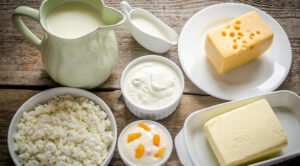
In May 2025, for the first time since December 2024, prices for extra-grade raw milk in Ukraine practically stopped falling and were slightly below 16.3 UAH/kg, according to the expert and analytical service of the Ukrainian Dairy Industry Association (UDIA).
The industry association calculated that the price level in April 2025 (in hryvnia) was 18.5% lower than in December 2024 and 2.5% lower than in September 2024, but 16.5% higher than in June 2024 and 7.5% higher than in December 2023.
At the same time, the average price in May 2025 (domestic quality basis, expressed in EUR) was lower than EUR35/100 kg compared to EUR37.4 in March and EUR40 in February this year and EUR45.7 in December 2024.
The average price, expressed in EUR and converted to the euro base, in May 2025 was lower than EUR 41/100 kg compared to EUR 44 in March and EUR 47 in February 2025 and EUR 53.7 in December last year.
The price level in May 2025 (converted to EUR and Eurobase) was 24% lower than in December last year, 4.5% lower than in September 2024, but 6.5% higher than in May 2024, although still 7% lower than in December 2023.
The ratio between price levels in Ukraine and the EU and Poland averages in May 2025 was 77% of the EU average and 76.5% of the Polish average.
“The corresponding ratio between the domestic price and the EU average price has not been recorded since July 2023,” the SMU noted.
Assessing the situation on other continents, industry analysts noted a decline in milk purchase prices in the US (below EUR41.3), Brazil (to EUR42.3), and New Zealand (to EUR39.5).
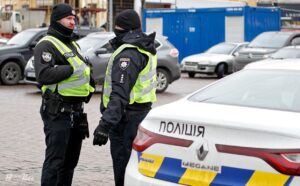
A number of streets in Kyiv have been closed due to night shelling, including Vatslava Havel Street, part of Povitryanykh Sil Avenue, and part of Boryspilska Street. Traffic on adjacent streets is difficult, according to Oleksiy Biloshitsky, first deputy head of the Ukrainian Patrol Police Department.
“Traffic has been blocked on Vatslava Havel Street; Povitryaniy Sil Avenue (from the intersection with Volynska Street to the Zhuliany overpass); Boryspilska Street (from Yaltynska Street to Staroboryspilska Street),” he wrote on Telegram on Monday.
According to him, traffic is difficult on adjacent streets.
Kyivpastrans also reported that as a result of the night attack, damage to transport infrastructure was recorded, in particular, tram routes No. 15 and No. 22 were temporarily suspended. Specialists are working to eliminate the consequences.
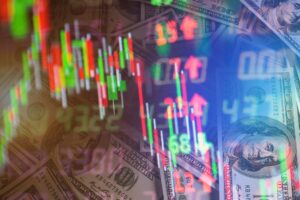
The National Bank of Ukraine (NBU) reduced its currency sales on the interbank market by $53 million, or 8.4%, to $585.8 million last week, with almost no currency purchases, according to statistics on the regulator’s website. As noted by the NBU, it purchased $0.50 million worth of currency for the first time in two weeks.
Data published by the regulator during this period show that the balance was negative throughout last week, fluctuating from $11.3 million on Monday to $11.6 million on Tuesday, $13.2 million on Wednesday, and $8.5 million on Thursday.
The official hryvnia exchange rate fluctuated from 41.4018 UAH/$1 at the beginning of the week, on Wednesday the hryvnia devalued to 41.5566/$1, and by the end of the week the rate was 41.4466 UAH/$1.
On the cash market, the hryvnia exchange rate remained virtually unchanged at the end of the week: the buying rate was approximately 41.40 UAH/$1, and the selling rate was around 41.45 UAH/$1.
“The end of May 2025 is characterized by moderate stability in Ukraine’s currency market in the absence of shock changes, despite external turbulence and a complex geopolitical background. The national currency maintains a controlled exchange rate against the US dollar, while the euro/hryvnia pair continues to show increased volatility, which is associated with both global trends and internal structural shifts in the currency preferences of businesses and the population,” experts from KYT Group, a major player in the cash currency exchange market, described the situation.
In their opinion, in the medium term of 2-4 months, the dollar-hryvnia exchange rate will return to the range of 41.80-42.50 UAH/USD, provided that imports grow, domestic inflation rises, or significant signals regarding external financing are received.
In the long term, over 6+ months, KYT Group expects a likely movement towards 43.00-45.00 UAH/$1 or even higher.
The review is available at the link – https://interfax.com.ua/news/projects/1080324.html